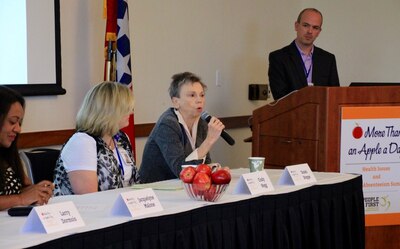Almost a fifth of Memphis students are considered chronically absent from school, and too often it’s because of an asthma attack, a toothache or an undiagnosed psychological condition.
Community leaders grappling with the city’s high rate of absenteeism frequently have cited challenges rooted in poverty — from students who struggle to get a ride to school to embarrassment over dirty uniforms. Now they’re zeroing in on a deeper related problem: chronic health conditions.
Last year, a staggering 44,000 Memphis students reported suffering from a chronic health condition, contributing to 18 percent of students missing at least 18 days of class in Shelby County Schools or the state-run Achievement School District.
“It’s clear that having a nurse at every school could greatly reduce the number of students who miss school for preventable health reasons,” said Lora Jobe, executive director of PeopleFirst Partnership, a coalition of business, government, academic and civic leaders. “The health concerns we’re talking about disproportionately affect impoverished children and children of color. In Memphis, addressing this should be a top priority.”
Community leaders came together Wednesday at the University of Memphis for a summit on how health disparities are causing youngsters to miss school. The gathering follows last month’s launch of an attendance campaign by Shelby County Schools, providing supports for 10 schools with the most-absent students.
Students in Memphis are mostly people of color and from low-income families, both groups with higher-than-average rates of asthma and untreated dental cavities.
Last year, in fact, Memphis was named the nation’s worst city to live with asthma, a chronic lung condition that leads to episodes of wheezing, coughing and shortness of breath, among other symptoms.

The summit was attended by doctors, dentists, nurses and mental health professionals, as well as education and nonprofit leaders. Discussions gravitated frequently to the importance of having a full-time nurse in each school, not only to treat students but also to educate their families about how to manage medical conditions that might keep their kids home from school.
Tennessee law requires only one nurse for every 3,000 students, and budget cuts have made it impossible for Shelby County Schools to keep a nurse in every school building. Instead, nurses rotate across the district, usually giving each school one day of medical staffing a week.
That’s not enough, said Angela Hargrave, the district’s director of attendance and discipline.
“Parents aren’t comfortable that their children will be properly cared for at school,” Hargrave said. “People at schools aren’t comfortable with that responsibility. We’re not medical professionals. Our front office staff isn’t trained for that.”
A full-time school nurse can provide the medical care or information that makes the difference in coming to school or staying home, said Cindy Hogg, director of health services at Le Bonheur Community Health.
“A nurse in the school building is often the only care provider many children in low-income areas in Memphis see for years,” Hogg said. “Of course, nurses should send students home when they are sick. But so often students are missing way more school than they should because no one in the health world is communicating with them or their parents.”
Jobe pledged that PeopleFirst Partnership, which organized the summit, will lobby local and state officials to enact and fund a policy that lower the school nurse-to-student ratio.
“I hope this time next year, when we see Tennessee require a nurse in every school, you will be able to say, ‘I was in the room when this started,’” Jobe told the group.

